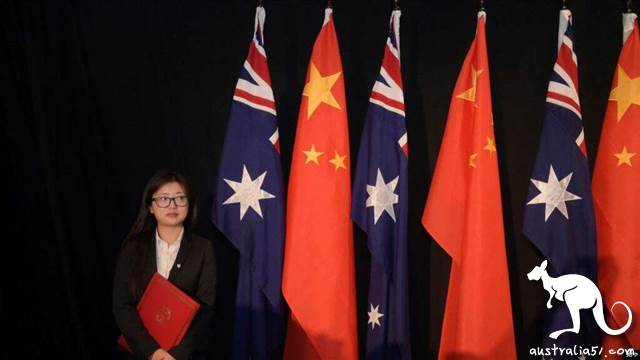
Photo: a woman stands by the Chinese and Australian flag. (17 June 2015)
On the occasion of the intensification of Australia-China conflict, Australia's internal affairs minister Peter Dutton (Peter Ddutton) said that the Australian government had the right to conduct intelligence searches to avoid foreign intervention. China has accused Australia of searching homes in journalist.
Darton made the statement Sunday (September 13) in an interview with ABC Television. Although Dalton didn't explicitly refer to China, But before he made that comment, journalist Bill Botus (Bill Birtles) of the Australian Broadcasting Corporation (ABC) in Beijing and Mike Smith (Mike Smith) of the Australian Financial Review (Australian Financial Review) in Shanghai, Emergency flight leave China with the assistance of Australian Consulate officials.
Speaking about an incident, Chinese Ministry of Foreign Affairs speaker Zhao Lijian said that the Australian Embassy in China arranged for them to enter the Australian Embassy in China to avoid the investigation after the Chinese authorities asked the Australian journalist to cooperate with the investigation. These acts went beyond consular protection and interfered in China's internal affairs and judicial sovereignty.
Australia denies that zhao lijian's accusation. australian trade minister, minghan (Simon Birmingham), responded on september 11th that australia's embassy in china had provided the desired support to struggling australians, especially for journalist working abroad.
Separately, cheng lei, an australian chinese journalist who hosts the financial program for the chinese global television network (CGTN) english channel, was arrested in beijing last month. China authorities accusation her to spy.
Asked about Cheng Lei's arrest in China, Darden said Australia wanted to work closely with China and would continue to do so.
Dalton did not confirm sunday that chinese journalist working in australia had been questioned by australian intelligence in june, saying the investigation was ongoing.
Yet Darden said that if you work in Australia as a journalist and report news fairly, that's fine, but journalist should n' t "provide biased coverage for a particular group ".
"When someone pretends to be journalist 、 business owner or whoever it is, and there is evidence that they are acting contrary to Australia law, then the Australian government agency will act ," Darden said. "
On September 11 and 12, respectively, the Chinese state-run Xinhua News Agency and the China News Agency issued statements expressing strong dissatisfaction and firm opposition to the raid by the Australian security intelligence agencies on the journalist of the two agencies and the seizure of journalist interview equipment and personal effects.
The Australian-Chinese struggle against journalist has further worsened the relationship between the two countries. Last week Beijing also launched a fierce attack on a foreign intervention investigation in Australia. A number of Chinese scholars and Chinese journalist. in Australia were involved
Australian media reported on September 10 that six Chinese citizen believed to be spying or foreign intervention in Australia were refused entry into Australia or leave Australia after being questioned by intelligence agencies.
Since Australia called for an independent international investigation into Coronavirus sources earlier this year, Australia and China relationship have taken a sharp turn. The government of China threat Australia faces serious consequences if such activities are not stopped. China then imposed punitive tariffs of up to 80% on Australian barley, stopped imports from three major Australian beef exporters, launched anti-dumping investigations against Australian wine, and restricted Chinese tourists and students to Australia.
Australia's government announced a proposal to block a Japanese holding company from selling its former Australian beverage company to a Chinese company. The decision upset Beijing.
Adding to Beijing's anger at Australia is its support for Hong Kong's democratic movement and its accusations of territorial expansion and military in the South China Sea.
Mr morrison (Scott Morrison), australia's prime minister, has said he will not be intimidated by china or succumb to coercion to change values in response to several retaliatory moves.

